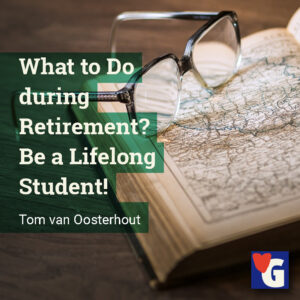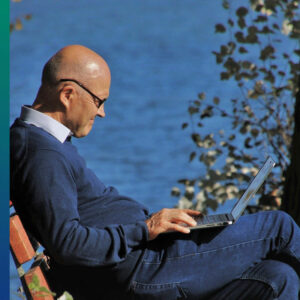
If what to do during retirement is an unanswered question for you, why not pick up a study? Studying late in life comes with an enormous amount of advantages. See it as a kind of exercise. It keeps your brain fit. And don’t worry about your brain: it’s stronger than you might think.
Both Hannie and I never stopped educating ourselves. We probably will be studying as long as we can read and listen. Lately I have been picking up my old love for literature again, more specifically for poetry. This gives me much pleasure.
However, the question is why you should study late in life. Of course, because to study gives pleasure. Yet there is more to this question that meets the eye.
Table of contents
Get inspired

In the years before we moved to Spain, I organized lectures at the university in Amsterdam. All these lectures were given by professors on topics they thought would be interesting for the students.
The students were men and women who were responsible for the decision-making process in city councils. Most of them were academics.
They came to the lectures for several reasons. The most important were: career advancement, broadening academic horizons and getting inspired. I always very much enjoyed the inquisitiveness of these students and the resulting discussions.
Academy for the Education of the Elderly
Some 10 minutes before the lectures for the civil servants started I entered my designated auditorium. Although this had to be empty for long, it was always still occupied by students of the ‘Academy for Education of the Elderly’ (HOVO). They couldn’t get enough.
From the flushed faces of these older students and the sweating of their tutor, I always gathered that these elderly were fanatic students. When I asked, both tutor and students wholeheartedly confirmed.
For all those retirees who don’t want to doze behind the geraniums, who still have some interest in what’s going on in the world, and who want to investigate it, this type of academy is a big delight.
Related: A Lottery to make Money? How to become Financially Healthy
Study satisfies curiosity

If not for career advancement, why would you want to be inspired or broaden your horizon? Especially when the subject matter is rather complicated.
For starters, you could educate yourself just because you’re curious. Even many people who have never been able to follow much substantial education, are often plain curious. They want to know everything. Some have specific subjects as a field of interest. For instance, many people are very interested in history.
Give study a try
Another reason could be that you want to enter a totally new field of interest. Perhaps aimed at picking up another career late in life? It’s often such a pity that such changes are hampered by all kinds of legal and financial restrictions.
Some people want to become educators themselves or educators want to get a more practical approach on issues they have been teaching about for years. Of course, curiosity as such is also enough of a reason.
Related: Do I Retire Early or Not? That is the Most Exciting Question
The Night Sky Network
Some people want to keep up with the developments in their field of expertise. Or they want to exchange their experiences with others in a more formal educational setting. Some want to update their theoretical insights.
Others want to contribute, to science or to society. There are amateur historians who know more about specific subjects than academics do.

Famous is the astronomical cooperation headed by NASA: Night Sky Network. Much helped by computers and the Internet amateurs and scientists made some significant discoveries by their combined efforts.
In archaeology there are many amateurs who know all about their field of expertise. They contribute with discoveries and new theoretical insights. There is no end to the list of subjects, and objects, that you can study.
Your brain is your body
To study late in life is good for your body! Your brain is the most essential part of your body. It covers all functions.
That is why it makes sense to treat your brain as you treat the rest of your body. This means that it’s wise to keep your brain fit and healthy. As with your body, you can do this with different types of exercise.
Do not only read books and articles. Also follow lectures, such as those of TED. Or try to write a book or an article, or give a lecture yourself.
Formal study
All the educational challenges in later life are facilitated when you follow a formal course. Many schools, colleges, and universities offer courses for the elderly. Many of them even have special departments. Often you can follow parts of existing programs.
Such programs require you to read books, discuss stuff with your co-students and do all kinds of choruses. Some of you do not cherish very good memories from their formal school time. This is all the more reason to try a formal course to experience what has changed.
You will notice that there was and is a lot of fun in formal education. You will also notice how important the feedback is from your tutor and co-students. Education is an excellent example of a very positive social process.
Home study

At the moment, with many countries in lockdown, it is impossible to follow any formal education in a physical institution. Moreover, not everybody has such an educational institution around the corner.
When you have difficulty to start all by yourself, there are many other opportunities. Harvard is just one of the famous universities that offers free courses on the Internet. They’re called MOOCs: Massive Open Online Courses.
However, no matter what reason or how, to educate yourself will always benefit you. If only because it will keep your brain fit.
What to do during retirement?
Hannie started studying affiliate marketing in 2020. It turned out to be a true double-edged sword: she is learning a lot of new material and is also earning money with her newfound knowledge.
On top of that, she is meeting other people from all over the world who share the same interest. So for her the question what to do during retirement, is easily answered!
What are your favorite activities? Tell us in the comment box below.
How about having fun and being happy, while at the same time earning money?
Join me in being an affiliate marketeer at Wealthy Affiliate.
Related article: Earn a Side Income as a Pensioner – Become an Affiliate


I definitely agree. It’s crucial to keep one’s brain fit. I mean, sure, it’s very important when we get older but I think it’s paramount to anyone really, no matter how old or young you are.
I totally agree with the notion of curiosity. I too believe that all people are inherently curious. I mean, personally, I probably wouldn’t bet on history for everyone (I think it really depends from person to person) but there’s definitely something for everyone out there. And hence, indeed, there is always something more fascinating to learn. With the internet and all the global stuff, now more than ever.
I will be checking out that Night Sky Network! Cheers.
Hi Matiss,
Thank you for your comment.
You’re right, a fit brain is no age-discriminating issue. Another interesting property of a brain is of course that it’s never switched off. Not even when we’re asleep.
Challenging our brain is like fitness for our body. And, of course, fitness for our body is also a good exercise for our brain.
There is no discussion that when we train our body, different muscles need different exercises. With the brain, it’s the same. Vary active and passive brain training, as much as memory and language training. Don’t forget to try something new now and again and to give your brain a rest.
For now, stay sharp.
Regards,
Tom
Wow! First and foremost I want to thank you for such an inspirational post. I am grateful for stumbling upon your website.
Sometime I feel too old and too tired and too busy to learn, however, after reading your post, though I’m not near retirement age yet, I now have a new perspective in life.
Your words bring to my remembrance my graduation’s ceremony. I graduated from a radiologic program in 2004 and I remember this older gentleman who graduated with us at the age of 63 if I’m not mistaken. I thought to myself what is this man going to do with a radiologic degree when he should be thinking about retirement?
Well I find my answer today through your post.
Today I learned old age does not mean you stop learning. Thank you Lord, you are awesome.
Great work, keep-’em coming.
Nicole
Hi Nicole,
To sometimes feel too old, too tired, and too busy are excellent excuses to do nothing. Nothing wrong with that, sometimes. Otherwise, you impose yourself with a new problem: stress. And stress paralyzes. That is ugly.
To be honest, it is actually impossible to ever stop learning. Your senses keep pouring in millions of messages all day and every day. 24/7 it’s called I guess. Fortunately, we do not have to remember all these signals. Most of them are used the instant we pick them up.
It’s also very fortunate that we can use all kinds of systems that extend our learning capabilities. Such as the computers we use, even pen and paper, and a calculator. These are all handy support systems. Use them to your advantage.
I’m glad that you, at your very young age, got a new perspective in your life.
Thank you for your comment and compliments.
For now, stay safe, stay healthy.
Regards,
Tom
This is some great information and I agree wholeheartedly. Too many people let themselves just drift off into obscurity after retirement. The fact is that you have to keep your brain engaged and “toned up” if you expect it to stay healthy. All of these study suggestions have good merit. Online study is more convenient, while classroom study is more stimulating in the sense that we’re interacting with other people. I love the mention of the Night Sky Network! And, since you asked, I am spending my retirement being a nanny for my grandchildren while their parents work. It might not be everyone’s idea of a dream retirement but it’s mine!
Hi Cynthia,
Sometimes I wonder whether there is anything more rewarding than nursing the grandchildren. Implying that nursing your grandchildren is also a first-class learning experience. In the sense that it’s personally very satisfying. Moreover, you also contribute to the possibility of the parents to go to work.
That’s also a totally different perspective on learning. We often learn something or study, for our own benefit. However, when we learn we also contribute to the benefit of others.
In an even broader perspective, we contribute to society. We alleviate ignorance. Make a better society. Help others to improve their lives. No matter how insignificant our contribution might seem. All those things are so easily ignored.
Enough said. For now, stay safe, stay healthy.
Regards,
Tom
I love learning new things and I am planning to learn a new language soon, but first I need to get organized, because I am also super busy, publishing a book, and writing articles for my websites. Learning is important for me, though, learning something new is fulfilling and it always makes me happy.
Now during lockdown many courses are offered for free. I didn’t know that Harvard is doing the same thing. Are the Harvard courses internationally available?
Hi Christine,
Some 20 years ago I contemplated following a summer course about the history of American poetry at Berkeley University in California. The course lasted 3 weeks, only in the mornings, 4 days a week. Costs: 5,000 US-dollars. Not including food, travel, or lodging.
The costs of following courses at Harvard are much higher. However, Harvard has free online courses and Berkeley doesn’t. As far as I know, all free online courses of Harvard are available everywhere:
https://online-learning.harvard.edu/catalog/free
Perhaps they even have a course ‘Get Organized’.
When it comes to learning, some organization comes in handy. Yet, at the same time, it’s good to realize that we learn all day, every day. Without any obvious effort. Our learning gets more explicit when we start to ask questions. Being so busy, some basic questions you should ask yourself, are: Why? What? Who? Where? When?
Why do I do what I do?
What do I actually do?
Who helps me, or can help me?
Where do I get what I need to learn?
When do I do the things that need to be done?
No easy job though. But it helps to get a bit more organized.
For now, stay safe, stay healthy.
Regards,
Tom
Fabulous article Tom. You never cease to amaze me with your articles covering a vast array of subjects and this article is no exception.
Personally, I love learning in any capacity. I love reading, fiction, non-fiction, biographies, poetry, classics, pretty much anything in print or online.
I have always loved reading, in fact at 10-years-old I ran out of books to read at home so I read the dictionary from cover to cover. Strange? Perhaps but I don’t think so. It only served to increase my thirst for knowledge.
To answer your question “what are my favourite activities in retirement?”
1. Well, I love travelling and meeting people, not at the typical tourist areas but actually getting to know the locals, learn their culture, discover the hidden gems that they don’t want full of tourists.
2. I love sailing in our sailboat, living off-grid and unplugged for days at a time is energizing beyond measure.
3. I love my vegetable garden. There is something so peaceful about digging about in the dirt and growing food that I can make into delicious and nutritious meals. I also love preserving that food for use in the winter.
4. I love reading and indulge daily wherever we happen to be.
5. Like Hannie, I have discovered I love having a blog-based website. I had no idea I loved researching and writing until my husband, Rick asked me to write an article for his website. It was magical like a switch was flicked on. Since then I have launched my own website and still write for his every week.
For me, learning is life for once I stop learning I will have begun dying. There is so much to learn, see, do, and experience in this life and I want it all.
So thank you Tom for getting me to really think about what I love to do during retirement so I can do more of it.
Looking forward to international travel again in the future. Who knows, we may find ourselves on the shores of Spain and we can meet for lunch.
Hi Deb,
Yes, that should be great, to meet for lunch on the Spanish coast. You’re more than welcome.
It’s exactly as you express it, learning has four focus points: reading, writing, listening, and speaking. This might signify that language is the main motor of learning. To a certain extent, this is true. Yet, I think that the images we see with our eyes, what we feel with our skin, and our smell, and taste, are also important learning carriers.
The difference though is between passive and active. To read and listen, are as passive as to see, feel, smell, or taste. Not passive in the sense that we don’t process the signals produced, but passive in the sense that the signals are mere personal experiences. Mere personal learning processes.
The difference with active learning, for instance through speaking and writing, is that this is more of a social process. You learn actively in association with others. This is why I like your first answer to my question about favorite activities in retirement so much. ‘Getting to know the locals’ is also one of my favorite pastimes.
Although I must confess that I only experience this to the full when I’m in the USA. In many other countries, there is often a language or cultural barrier. My alternative is to enjoy social life by walking around in non-tourist areas.
Once we lodged outside Rome in the countryside and traveled to this city by slow train. We ended up in a city area where only locals lived. Cities such as Paris, London, Berlin, and Madrid also have a lot of areas where no tourists are to be seen.
One of my favorite spots, in the city where my son lives, is the square in front of the stadium of the local soccer club. It’s situated on top of a hill. From there you have a beautiful view across the entire city of Madrid. You can see the planes taking off and landing at the International airport of Barajas on the other side of the city. You can also see the Siera de Guadarrama where the Escorial is situated, the castle of the Spanish king Philip II (who happened also to be the Dutch king). In winter the Sierra is always covered with snow. Not even the locals seem to particularly cherish this beautiful spot because I’ve never seen anybody else there enjoying the view.
You’re right, we learn until we die. That’s pretty good I guess.
For now, stay safe, stay healthy.
Regards,
Tom